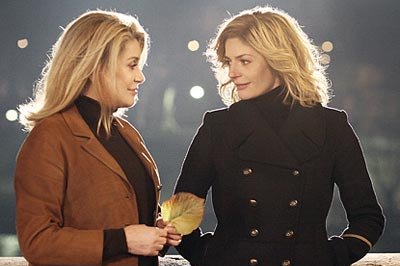Three French films by gay filmmakers and/or featuring queer characters open at the Ritz Theatres in Philadelphia in the next two weeks. One is worthwhile, but the other two are misfires.
Openly gay writer/director Christophe Honoré’s ambitious “Beloved,” opening Aug. 31, is a mind-boggling, globetrotting endurance test. This 135-minute musical opens in 1964 Paris, with Madeleine (Ludivine Sagnier) stealing a pair of Roger Vivier pumps. Her shoes prompt a stranger to think she’s a whore. She sleeps with him, and then with Jaromil (Rasha Bukvic), a handsome Czech doctor, who knocks her up and whisks her to Prague during the Russian invasion. Cut to 1978 Paris, and then to 1997 London, where Madeleine’s daughter, Vera (Chiara Mastroianni), has a fabulous dance scene in a nightclub. She catches the eye of Henderson (Paul Schneider, miscast), an American drummer and former veterinarian.
Henderson’s flirtation with Vera, which includes him kissing and orally servicing her in a bathroom, is perplexing. Were it not for Henderson declaring he is gay, viewers might think he was bi, or even straight: He has very little same-sex contact in the film. Perhaps Honoré is addressing the mutability of sexuality, but there is no fluidity as Vera becomes sexually obsessed with Henderson, and he remains indifferent to her. In one of the film’s oddest subplots, Vera wants Henderson to impregnate her. He insists this is not a good idea, but then they have a threesome with his boyfriend, which is more discomfiting than sexy.
Meanwhile, Madeleine (Catherine Deneuve as the adult Vera’s mother) is remarried, but having an affair with Jaromil (played by filmmaker Milos Forman).
“Beloved” is all about not being able to love the one you’re with, or live without the one you love. But Honoré greatly overreaches, cramming AIDS, the Sept. 11 tragedy and a suicide into this peculiar melodramatic musical. The tunes are not very catchy, and the performers try, but they can’t make “Beloved” sing.
“Little White Lies,” opening Sept. 7, also features plenty of music, here in the form of upbeat American pop songs. These tunes are used to manipulate the audience into feeling good about the characters, all of whom behave badly.
Ludo (Jean Dujardin) is hospitalized in the intensive care unit after a horrific motorcycle accident. His best friends, however, still take their annual vacation, and grapple with their own problems. The wealthy Max (François Cluzet) is particularly unnerved — not because of Ludo’s critical condition, but because his best friend Vincent (Benoit Magimel) has just confessed his love for him. However, Vincent, displeased with Max’s negative response to his admission of attraction, asks his friend to keep this secret from both of their wives and their mutual friends. Of course it creates friction, especially when Vincent and Max are forced together throughout the vacation.
Max is such an extremely unlikable character, it is difficult to see what Vincent finds appealing about him. Max barks at everyone, flaunts his wealth and is just plain mad at the world — at everyone and everything in it. Why Vincent moons lovingly over this jerk, staring at him longingly on the soccer pitch, is a mystery. When Max forces Vincent to confront the big pink elephant in the room, “Little White Lies” shows a moment of promise of treating its queer character respectfully, but it is fleeting.
The other storylines are equally lame. Eric (Gilles Lellouche) and Antoine (Laurence Lafitte) both have girlfriend troubles and mope about their absent women constantly. Marie (Marion Cotillard) also struggles with relationship issues. There is a brief suggestion of her having a lesbian affair, but it is never mentioned again.
This glossy, watchable film addresses how people cope with their insecurities and fears by lying to themselves and others. But the only real question “Little White Lies” raises is why these characters are all friends. They are a supremely annoying, selfish and rather unpleasant group of people. It is a relief when a truth-telling character finally chastises them for being annoying, selfish and rather unpleasant.
Cotillard does her best in an underwritten role, but the usually dependable François Cluzet overplays his part. In support, Dujardin is off screen for far too long. One of the film’s flashbacks features him performing in drag, which is amusing and spirited. But much of “Little White Lies” is just a drag.
The best of the three films is gay filmmaker André Téchiné’s intriguing new drama, “Unforgivable.” The film, opening Sept. 7, has crime writer Francis (André Dussollier) asking bisexual real-estate agent Judith (Carole Bouquet) to move in with him. Later, when Francis suspects Judith is cheating on him, he hires her ex-lover’s son Jérémie (Mauro Conte) to follow his wife. Does Francis’ spying on Judith prompt her to sleep with Jérémie? Are Francis’ actions a scheme to cure his writer’s block? And what are the ramifications of Judith’s affair? The film remains spellbinding as it slowly reveals the answers.
However, Téchiné is really delving into deeper themes of human nature. In the film’s most interesting sequence, Jérémie is followed by — or perhaps lures — a gay man through the canals of Venice, and the stranger makes a pass at him. Jérémie rejects him, throwing the man into the water. The gay man later exacts a violent revenge.
“Unforgivable” is really about the violence — be it physical or emotional — that people commit toward others. Francis, Judith and Jérémie are each seductive and sinister, and how they gain and lose control with lovers and family members is fascinating to watch. Téchiné may deliberately obfuscate his meanings, but the connections he creates sneak up on viewers — and generate tremendous insights.
